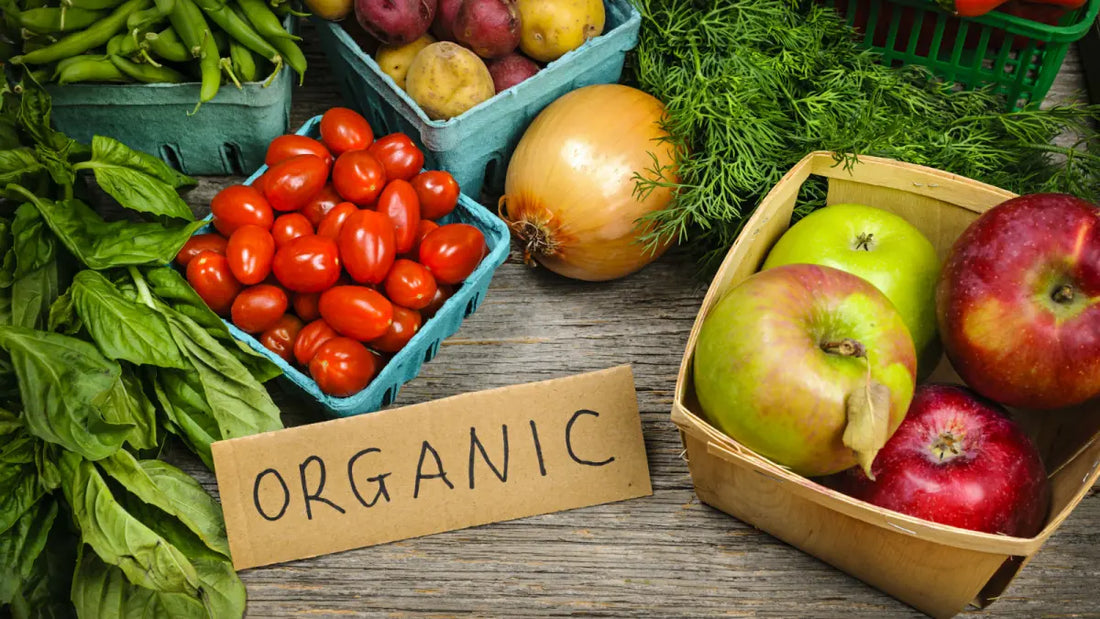
What does “organic” actually mean?
Share
What is Organic Food?
The term "organic" refers to how food is produced. Organic foods are grown or farmed without using artificial chemicals, hormones, antibiotics, or genetically modified organisms (GMOs).
To be labeled organic, food must be free of artificial additives like sweeteners, preservatives, colors, flavors, and monosodium glutamate (MSG).
Organic crops typically use natural fertilizers like manure to boost plant growth, while organic animals are raised without antibiotics or hormones.
Organic farming often leads to better soil quality, conserves groundwater, and reduces pollution, which can be better for the environment.
Commonly bought organic foods include fruits, vegetables, grains, dairy products, and meat. There are also processed organic products available, such as sodas, cookies, and meat substitutes.
Nutritional Value of Organic Foods
Studies comparing organic and non-organic foods have had mixed results, but some evidence suggests that organic foods may be more nutritious.
Organic crops often contain higher levels of antioxidants and certain vitamins, like vitamin C, zinc, and iron. Antioxidant levels in organic foods can be up to 69% higher.
For example, one study found that organically grown berries and corn had 58% more antioxidants and up to 52% more vitamin C.
Organic plants tend to produce more of their own protective compounds, such as antioxidants, which might explain the higher levels found in these foods.
Nitrate Levels
Organic crops generally have lower levels of nitrates, which have been linked to an increased risk of certain cancers and a condition in infants called methemoglobinemia, which affects oxygen transport in the body.
Organic Dairy and Meat
Organic dairy and meat may contain higher levels of omega-3 fatty acids, which are beneficial for heart health, and slightly more iron, vitamin E, and certain antioxidants. However, organic milk may have less selenium and iodine, essential minerals for health.
A review of 67 studies found that organic meat had higher omega-3 fatty acids and slightly less saturated fat than conventional meat. However, other studies found no significant differences.
Less Chemicals and Resistant Bacteria
Many people choose organic food to avoid artificial chemicals. Evidence suggests that organic food may reduce exposure to pesticide residues and antibiotic-resistant bacteria.
One study found that organic produce had 48% lower levels of cadmium, a toxic metal, and pesticide residues were four times more likely in non-organic crops.
Although the levels of cadmium and pesticide residue in non-organic produce were within safety limits, some experts are concerned that cadmium can accumulate in the body over time.
Health Benefits of Organic Foods
There is some evidence that organic foods may offer health benefits, such as higher antioxidant levels that help protect cells from damage. Animal studies have shown that organic diets can benefit growth, reproduction, and the immune system.
Older studies suggest that organic foods may lower the risk of allergies and eczema in children. However, a large 2014 study found no difference in cancer risk between people who ate organic food and those who didn’t.
More high-quality human studies are needed to confirm these potential benefits.
Not All Organic Food is Nutritious
Just because a product is labeled "organic" doesn’t mean it’s healthy. Some organic products, like cookies, chips, sodas, and ice cream, can still be high in calories, sugar, salt, and unhealthy fats.
When choosing food, it’s more important to focus on your dietary needs and the nutrients in the food rather than just whether it’s organic or not.
How to Identify Organic Food
The United States Department of Agriculture (USDA) has an organic certification program. To ensure you’re buying organic, look for the USDA organic seal or labels that say:
- "100% organic" (made entirely from organic ingredients)
- "Organic" (at least 95% organic ingredients)
- "Made with organic ingredients" (at least 70% organic ingredients)
If a product has less than 70% organic ingredients, it can’t be labeled organic or use the USDA seal. Similar standards exist in Europe, Canada, and Australia, each with its own seal.
The Bottom Line
The evidence is mixed on whether organic foods are more nutritious than conventional foods. Eating organic may reduce exposure to artificial chemicals, hormones, and antibiotic-resistant bacteria, but organic food can be more expensive and less accessible.
Choosing organic food is a personal decision based on your preferences.